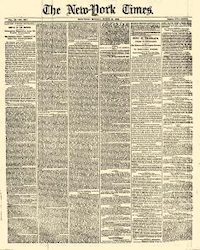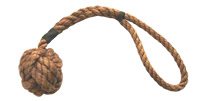The New York Times, May 25, 1860
Death of the Steward, and Inquest Upon the Body
The Crew Charged of Mutiny and Murder
The Case before the U.S. Commissioner Hon. K.G. White
The steward of the ship Wm. F. Storer, who was mortally wounded with a  hand-spike during the progress of the mutiny which occurred on board that vessel while she was proceeding down the Bay on Wednesday afternoon, died at the New-York Hospital yesterday morning. The name of the deceased is ascertained to have been ANDREW MITCHELL, and the circumstances under which he received his death-wounds are narrated in the following testimony, which was taken at the inquest by Coroner SCHIEMER:
hand-spike during the progress of the mutiny which occurred on board that vessel while she was proceeding down the Bay on Wednesday afternoon, died at the New-York Hospital yesterday morning. The name of the deceased is ascertained to have been ANDREW MITCHELL, and the circumstances under which he received his death-wounds are narrated in the following testimony, which was taken at the inquest by Coroner SCHIEMER:

A slungshot
Capt. Benj. J.H. Trask deposed: I reside in Brooklyn and am Captain of the ship Wm.F. Storer; on Wednesday we left the dock at 11 o’clock A.M., on our way to Liverpool, but were forced to anchor in the North River on account of the insufficiency of water on the bar; we got under weigh in the course of a couple of hours, and were going down the Bay in tow when some one came to me in the cabin and stated that there was a disturbance with the crew; I went into the after cabin and armed myself with a pair of pistols and a life preserver slung shot, when going forward I asked what was the matter; the men replied that the forecastle was closed and they wanted it opened; I replied that they did not want is open while weighing anchor, and one of them, Alfred Ryder, said “we do want it open; will you open it” I said “No; go to your work;” he answered “I’ll see you d — d first, you old gray-headed son of a b — b;” I told the mates to take him aft and place him in irons, at the same time taking hold of him myself; he then seized a belaying pin and attempted to strike me with it, but I felled him with a slung shot; another man then approached me with a belaying-pin, but I knocked him down also; the blow broke the life-preserver, and another man raised a handspike at me; as he came toward me I drew a pistol and snapped it at him, but it did not go off; I pulled out my other pistol and leveled it at him, retreating at the time backward toward the cabin, the pistol keeping the man at bay; I did not pull the trigger, because I feared that might miss fire also, in which case I should have been instantly killed; I went into the cabin and loaded some other pistols which I had, and while thus engaged the men came aft and stove in the cabin windows; I came on deck the after way, and found the man standing there armed with handspikes, belaying-pins, chain-hooks and axes; they swore they would kill me, and abused me a great deal; presently one of them fired a pistol at me, and I returned by firing several shots at the crowd, they continued their firing and passed their pistols into the forecastle where they were reloaded; their weapons were a revolver and two double-barreled pistols: these arms were fired by three different men, named James Dillon, Robert Craig and Alfred Ryder; a ball pasted through the cabin door, my wife and several passengers being in the cabin; when the disturbance first commenced I had a signal of distress displayed and the vessel was turned back toward the City; on observing the signal the Harbor Police came on board, but until their arrival the crew kept throwing marlin-spikes and other articles at the pilot and myself; the Police arrested part of the men and put them in irons; they also searched the forecastle; I did not see the steward during the disturbance, having enough to do in taking care of myself; I afterwards learned that he was badly hurt; I recognize all the prisoners as having participated in the row; it is customary to lock the forecastle when leaving port when it is suspected that the crew have liquor concealed there; the men came on board perfectly sober, and to all appearances remained so until after they had had their dinner.
David B. Dearborn, a commission merchant, doing business at No. 62 South-street, witnessed the mutiny, and corroborated the testimony of the Captain. He saw the three prisoners, Ryder, Craig and Dillon, beating the steward with marlin-spikes and belaying pins, and also observed both Ryder and Craig fire pistols.
Peter W. Carr, the second mate, deposed: I was below decks when the row commenced; the men were heaving the anchor, when they suddenly stopped; I found out that the forecastle had been nailed up by direction of the mate, and that this had caused the trouble; I ordered them to work again, and all complied but Ryder, who stood threatening the carpenter; presently I heard a row aft, and went to the assistance of the captain, who was attacked by the crew; I was dragging a man aft to put him in irons, when I heard some one call out, whom I believe was the steward, “Mr. Carr, look out!” I raised my head and saw Smith and Craig, each with handspike, and Craig, with his, knocked the deceased down; I was then knocked senseless myself by Smith with his handspike; when I recovered I was in the cabin, and on going upon deck I found the ship still in possession of the crew, they were all armed, and throwing missiles at the captain and officers; when the steward and myself were knocked down we were amidships; the blow which Craig struck the steward was powerful enough to have felled an ox.
Benj. B. Overlook, first mate of the Storer, deposed: I ordered the forecastle to be nailed up because the men were running there to obtain liquor; I fully corroborate the statement of the captain with reference to the mutiny; at the commencement I heard a pistol-shot close to my head, and upon drawing my revolver, it was knocked out of my hand with a handspike by one of the crew, who secured the weapon.
Dr. Robert W. Weir, Hospital Surgeon, made a post mortem examination of the body, which showed that deceased had died in consequence of a fractured skull; the wound was very extensive, a considerable portion of the skull having been crushed in, and the doctor was of opinion that the injury had been inflicted with a blunt instrument.
Coxswain Nesbitt, of the Harbor Police, testified to the disorderly condition in which he found the vessel and the mutinous state of the crew.
The Jury then retired and soon returned the following verdict;
“That deceased came to his death from concussion and compression of the brain from blows-at the hands of Robert Craig, James Dillon and Alfred Ryder, May 23, 1860. Further, we consider Joseph McDonald, George Beecher, James Brown. Wm. Smith, and George Cross as accessories to his death.”
In reply to the questions of the Coroner, the prisoners responded either they were not guilty of the charge or knew nothing of the manner in which the fatal blow was given. The accused were then returned to the Tombs in custody of the officers of Marshal Rynders, by whom they had been already held on a charge of mutiny. Scarce one of them but bears a scar received in the conflict, and they all present an appearance of brutality and degradation. Mr. Carr, the second mate, and Simon Gaffney, one of the seamen who refused to participate in the mutiny, were detained as witnesses. Deceased was an Irishman, 47 years of age, and has left a wife and family.
BEFORE UNITED STATES COMMISSIONERS’ COURT
George Beecher and seven others, seamen belonging to the crew of the ship Wm.F. Storer, of this port, who mutinied on Wednesday last as she was about sailing for Liverpool, were yesterday brought before United States Commissioner K.G. WHITE for examination. The whole party exhibited personal evidences of the fearful riot in which they had been engaged, being covered with wounds and bruises received in the fray. The Captain, two mates and the boatswain were examined, and testified, as before the Coroner, to the riotous and mutinous conduct of the men. A carpenter’s tool chest was seized, and the hammers, chisels and other edge tools indiscriminately need in their attack upon the officers. The whole party were remanded for trial, and their case will be immediately sent to the Grand Jury.